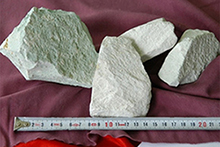On Sale But Is It Safe: LitterMaid Natural Zeolite Litter Box Deodorizer
 Clinoptilolite
ClinoptiloliteCredit: Gordes Zeolite
LitterMaid Natural Zeolite Litter Box Deodorizer is on sale this week at Petco marked down 15%. Not being familiar with "Zeolite" this item caught my attention for further research.
Background
Zeolites are a class of minerals primarily used at adsorbents and catalysts and have been known since the mid 1700s. Zeolites can be produced on a large scale synthetically but also are widely available in nature. Of the naturally mined zeolites, about two thirds originates from China. However, the US Geological Survey (USGS) caution that not all material marketed as zeolite contains zeolite. In some cases, a large percentage of the material is in fact volcanic tuff (compacted ash).
The structure of zeolites make them ideal for many uses ranging from biological (medical, agriculture) to industrial (petrochemicals and nuclear waste processing) to commercial (detergents, kitty litter). Clinoptilolite, one of the more common zeolites, has been extensively tested for its ability to trap heavy metals and other undesirable agents. In the case of cat litter, clinoptilolite takes up moisture and binds the ammonium in urine, preventing it from transitioning to gaseous ammonia. Basically it kills the smell.
Analysis
Generally speaking, zeolites are very safe. I did find one alarmist post that implied miconized (powdered) zeolite was harmful and should not be used medically because it contained a lot lead and other metals. However, all natural zeolites will have some heavy metals already bound into their stucture. These metals are not released by the micronizaztion process but can be by immersing in certain liquid chemical as was done by that author.
There have been reports of heavy metals found together with zeolite and this is most likely to have happened when the "zeolite" is in fact volcanic tuff. One example occurred when a South African firm marketed a product called Vulkansandkuren that had high levels of arsenic, mercury, cadmium and many other metals.
In some cases, manufacturers/distributors will resell previously used zeolite. This is more a problem of efficacy than of exposure to trapped metals. Once the zeolite binds to metal cations, it is extremely hard to isolate them again. Instead, the zeolite will reach its capacity to adsorb additional contaminants.
VERDICT: The cat litter industry uses clinoptilolites, A for safety.


